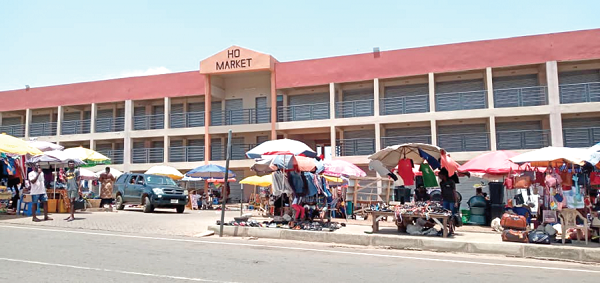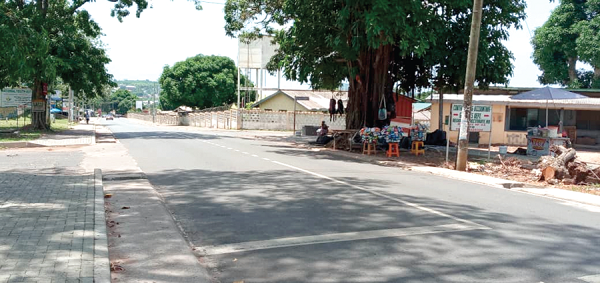
The COVID-19 impact: Circus of anxiety for Ho residents
When the world was first hit by the novel coronavirus (COVID-19) pandemic in November, 2019, only few people gave it any serious thought or concern.
In the Volta regional capital, Ho, there was not a scintilla of fear among people from the onset of the virus which was first reported in China’s Wuhan Province, before the Yuletide in December, 2019.
Many were those who thought and felt that COVID-19 was peculiar only to China and would pass just as had been the case with Ebola, SARS and other notable diseases.
Today, however, there is a higher level of uncertainty and anxiety among the world population, than there used to be prior to the pandemic. It took a while, however, for the impact to be felt in Ho and the Volta Region at large.
Many were the sceptics who, like before, believed a magical “Passover” would occur and Ghana would be left untouched.
Nogokpo
Some residents in Ho surmised that the region was “untouchable”, as the virus ravaged other parts of the world. There were others who calmed nerves with unproven opinions and conspiracy theories related to the disease.
It was not uncommon to hear “Oh God forbid, coronavirus will not get here,” from people with unwavering religious faith, with some declaring their emphatic confidence in the great deity of “Nogokpo” who they said would not allow the disease to affect the region .
Even though such line of thought sounded appealing, especially against a ravaging monster that no one knew how to tame, it was not realistically applicable or possible. It reminded me of the saying “if wishes were horses, beggars would ride.”
Reality, however, dawned when Ghana unfortunately recorded its first two cases in March, 2020. Immediately, there were calls from various quarters on the need to urgently close the country’s borders.
After his first address to the nation on Wednesday, March 12, 2020, President Nana Addo Dankwa Akufo-Addo, brought with him rekindled hope, as he enumerated enhanced measures taken against the pandemic.
Some residents of Ho, like those in other parts of the country, however, remained unperturbed and rather transformed information on the virus into comic relief chatters.
First nine cases
Just two weeks later, the Volta Region recorded its first nine cases of COVID-19 with one in Ho, Hohoe and Aflao. The news sent shivers down the spines of residents all over the region, some of whom could not fathom the possibility of the existence of the case.
“Who could that be, and where is he or she from? How many people may he or she have come into contact with?” were common queries on the lips of all.
Suspicions were rife because unlike Accra and other busy suburban areas, Ho is large but with a relatively small population where everybody knew somebody. This increased anxiety among residents who limited bodily contacts and observed preventive measures stipulated by the Ghana Health Service.
These individuals went as far as locking themselves up at home, while observing extreme physical distancing protocols.
The streets of Ho became a pale shadow of themselves with virtually no activity compared to previously when people went about in pursuit of their daily businesses. Entrances to businesses and offices have been “occupied” with Veronica buckets and hand sanitisers and liquid soap to encourage handwashing.

A deserted street in Ho
Information, protocols
Business flyers plastered on walls and doors were quickly replaced with leaflets bearing information on COVID-19. Others had already taken to donning nose masks before it was made compulsory.
Anxiety was at an all-time high when the region recorded additional cases, after it was announced that rigorous contact tracing was going to be carried out in Ho and its environs following the confirmation of the COVID-19 case at the Ho Teaching Hospital.
This sort of anxiety was, however, conspicuously missing amongst market women and traders who continued to operate in their heavily populated environment with gleeful disregard to preventive measures and social distancing protocols. This was even after a large-scale fumigation exercise which had led to the closure of the market; the first of such activity.
With 47 recorded cases of COVID-19 as of Sunday, May 24, signs of fear vividly showed on the faces of almost everyone walking the streets of Ho. The large number of people clad in nose masks in Ho indicates the enormity of the invisible war being waged against COVID-19.
A peculiar trait noticeable with the onset of the virus is the alteration to culturally recognised salutations such as handshakes which have always been associated with the Ghanaian culture, including that of the Ewes as people continue to adhere to the W.H.O. recommended protocols in the face of COVID-19.
Lessons
There are many lessons to be drawn from the COVID -19 pandemic, one of which is the significance of public discourse devoid of partisan inclinations. It has provided a common platform for deliberations and holistic collaborations even between political parties which is rare in the country with elections around the corner.
This new norm could become a blueprint in our effort as a country to tackle other issues of utmost importance. This pandemic has impacted high end businesses, corporate entities and even state actors, including ministers who have committed half of their salaries to aid the fight of the disease.
Residents of Ho and the rest of Ghana, similarly, are eager to resume their normal lives. The occasional interactions, extroverted activities and a boom in business are awaiting revival, but it would take a greater commitment from citizens and our industrious frontline workers to make this happen in the shortest possible time.
COVID-19 is a strange teacher whose students are not given a fair chance to learn from its lessons. God be our helper!
